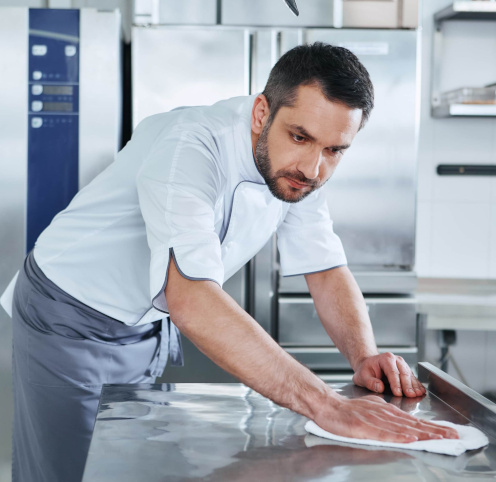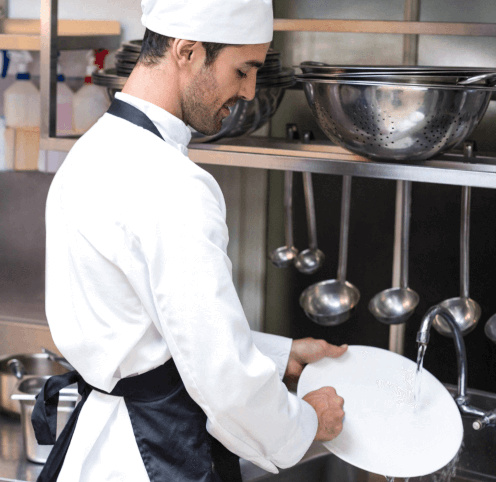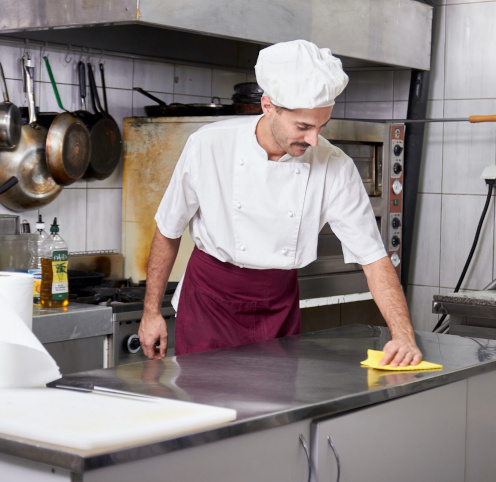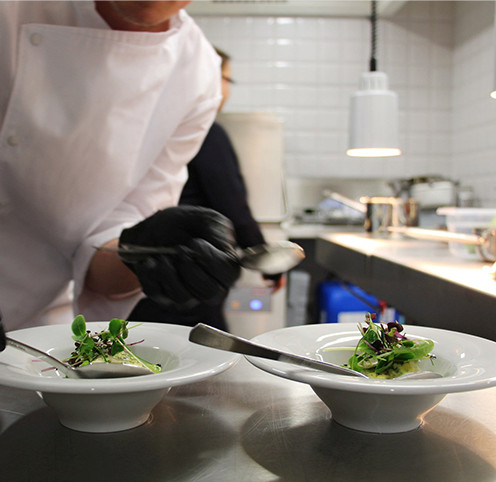Cleaning a Professional Kitchen: Useful Tips
In our country, the general hygiene and special requirements for food handling are laid down in the Lithuanian Hygienic Standard HN 15:2005 “Food hygiene”. Its successful implementation is monitored by a number of bodies, including the State Food and Veterinary Service (SFVT). Successful compliance with restaurant cleanliness rules ensures calm audits by inspectors and reduces the risk of fines – sometimes up to €15,000. In addition, high hygiene ratings build trust and contribute to your restaurant’s impeccable reputation. So, what steps can be taken to meet the institutions’ requirements and ensure an ideal clean kitchen? Read our overview of professional kitchen cleaning.
WHAT ARE THE HYGIENE STANDARDS?
The hygiene of a professional kitchen depends on the cleanliness of the common areas, equipment and inventory, as well as the hygiene of the staff. Many of these aspects are described in the Lithuanian Food Hygiene Standard approved by the Minister of Health. It states that:
- frequently touched surfaces and shared utensils and packaging provided to visitors must be disinfected at least once a day;
- visitors’ tables (except when disposable tablecloths are used) must be cleaned and disinfected after each visit;
- it is important to use separate, appropriately labelled equipment for food handling (for example, we have color-coded cutting boards for this purpose at AUDORES shop);
- detergents, cleaners or biocidal products need to be sorted by premises and use. They must be kept in their original packaging, in the designated place and used for their intended purpose in accordance with the manufacturer’s instructions.

Keeping restaurants tidy is made easier by having a consistent and clear plan of cleaning tasks. We therefore suggest that you divide your cleaning tasks into several phases – daily and monthly.
Appliances that should be cleaned on a daily basis: kitchen worktops, charcoal grills, cooking kettles, convection ovens, gas cookers, vegetable slicers, industrial fryers, sinks, microwave ovens and other restaurant equipment. Don’t forget textiles (cloths, towels, aprons, etc.) and floors. Make time to clean food refrigeration equipment (industrial fridges and freezers) every month, and cleaning ventilation systems once every 3 months should be sufficient.
SURFACE CLEANING
Bacteria are probably most likely to spread on surfaces where there are cracks. There’s a reason why professional restaurant equipment is designed to minimise cracks. Stainless steel tables also dominate in restaurants – a material specially adapted for professional use and resistant to cracks, impact, rust and fire.
For cleaning surfaces, we recommend surface-protecting sponges or cloths and deep penetrating disinfectants. Specially formulated detergents will help you wipe away food residues, stains or grease cleanly and quickly.
It is a good idea to store used textiles and sponges for cleaning only in their designated areas and containers, and to wash them at the end of the working day at a temperature of at least 60 degrees.

SINK CLEANING
A professional kitchen sink requires special care. As grease is insoluble in water, it clings to surfaces and provides a very favorable environment for bacterial growth. Therefore, the sink should be cleaned with cleaning and/or disinfecting agents as often as possible and at least once a day.
Grease that leaks into the sink easily clogs the pipes and starts to give off an unpleasant smell. This can be avoided by a grease separator, which is usually connected to commercial dishwashers and sinks. It protects sewer systems from the constant flow of grease and blockages. It is recommended that the grease accumulated in this unit is drained once a day and the whole unit is washed once a week.
DISHWASHER AND POTWASHER CLEANING
In addition to the aforementioned grease traps, pre-rinse spray ensure smooth operation and easier cleaning of dishwashers and pot-washers. By rinsing your dishes, pots and utensils with a stream of water, you reduce the risk of clogging the dishwasher filter and taking out stained, under-cleaned kitchenware after washing.
Also remember to use dishwasher salt, as it softens the washing water and protects the appliance and pipes from limescale build-up.

In addition to equipment and salt, there are additional measures to help keep dishwashers clean and ensure their long-term performance. It is:
- multi-purpose cleaner;
- rinse aid for quick drying;
- dishwashing detergent for aluminium dishes only;
- descaling agent (soup kettles, cooking kettles, coffee machines can also be cleaned with this agent);
- non-scratching surface sponge.
In the dishwasher, utensils and dishes should be washed at a temperature of at least 60 °C, so we recommend that you leave the door open for at least 10–15 minutes after each wash to allow any moisture to evaporate.
EQUIPMENT THAT KEEPS THE KITHEN CLEAN
The AUDORES range includes a variety of equipment to help make your professional kitchen cleaning routine easier. These include conveniently operated washbasins, knife sterilizers, automatic water softeners and other appliance.
If you have any questions about kitchen cleaning equipment or maintaining general kitchen hygiene, please feel free to consult us by email or phone.
